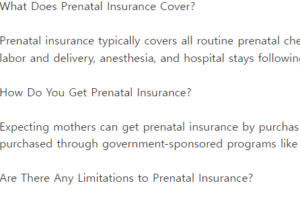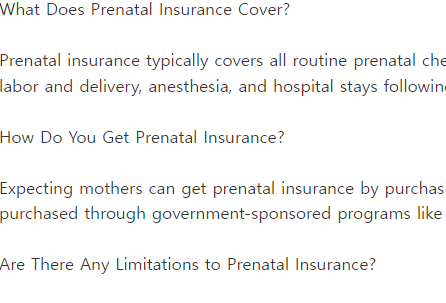태아보험 필수특약
Prenatal Insurance: A Must-Have for All Expectant Mothers
As an expectant mother, it’s essential to prioritize your health and that of your unborn child. One of the ways to do that is by investing in prenatal insurance. Prenatal insurance offers expectant mothers access to medical care, testing, and other necessary services throughout their pregnancy and after delivery. Here’s everything you need to know about prenatal insurance.
What is Prenatal Insurance?
Prenatal insurance is a type of health insurance that covers expectant mothers from conception through delivery. The insurance also covers the newborn’s first few months after delivery, depending on the policy. The coverage may include prenatal checkups, prenatal testing, labor and delivery, and postnatal care.
Why is Prenatal Insurance Necessary?
Prenatal care is essential to ensure that both the mother and baby remain healthy throughout the pregnancy. Without proper prenatal care, expectant mothers are at risk of developing complications like gestational diabetes, high blood pressure, and other conditions. Prenatal insurance provides financial protection and ensures that expectant mothers have access to the best possible medical care.
What Does Prenatal Insurance Cover?
Prenatal insurance coverage varies depending on the policy. However, most policies cover prenatal checkups, routine testing, and hospital charges during delivery. Certain policies may also cover prenatal vitamins, ultrasounds, and maternity-related prescriptions.
How to Get Prenatal Insurance?
There are several ways to obtain prenatal insurance. Employer-sponsored insurance plans typically cover prenatal care, while individual plans can be purchased through private insurance companies. Medicaid and CHIP (Children’s Health Insurance Program) also provide comprehensive prenatal care coverage for eligible applicants.
When Should I Get Prenatal Insurance?
Expectant mothers should obtain prenatal insurance coverage as soon as possible to avoid any medical expenses that may arise during pregnancy and delivery. Ideally, they should obtain coverage before becoming pregnant or early in their pregnancy.
What are the Benefits of Prenatal Insurance?
The benefits of prenatal insurance are numerous. It offers financial protection, ensures access to medical care, and provides peace of mind knowing that you and your baby are receiving the best possible care. Prenatal care coverage enables early detection and treatment of any possible complications, leading to a healthy pregnancy and delivery.
In Conclusion
Prenatal insurance is a must-have for any expectant mother. It provides financial protection, access to medical care, and peace of mind. The coverage typically includes prenatal checkups, routine testing, and hospital charges during delivery. Ensure you obtain coverage before becoming pregnant or early in your pregnancy to ensure you and your baby receive the best possible care.
FAQs
1. How much does prenatal insurance cost?
The cost of prenatal insurance varies depending on the policy. On average, it ranges between $50 to $200 per month.
2. What happens if I don’t have prenatal insurance?
Without prenatal insurance, expectant mothers may have to pay out of pocket for medical care. The cost of prenatal care and delivery can be substantial.
3. Can I add prenatal coverage to my existing insurance policy?
Yes, most insurance companies allow you to add prenatal coverage to your existing policy.
4. Does Medicaid cover prenatal care?
Yes, Medicaid provides comprehensive prenatal care coverage for eligible applicants.
5. What is the difference between Medicaid and CHIP?
Medicaid provides health coverage for children, families, and individuals with low incomes. CHIP provides healthcare coverage for uninsured children under age 19 from low-income families.
6. Can I change my prenatal insurance policy during pregnancy?
Yes, you can change your prenatal insurance policy during pregnancy. However, it is best to do so before becoming pregnant or early in your pregnancy.

